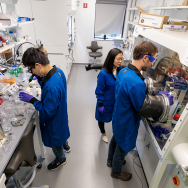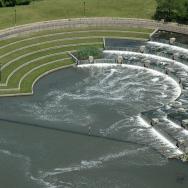The Pritzker School of Molecular Engineering at the University of Chicago will celebrate its 10th anniversary throughout the 2021-2022 academic year, with major events planned that highlight the school’s ongoing mission to develop new solutions for pressing global challenges.
The anniversary events include an alumni and industry day on Sept. 17 and a scientific conference on Sept. 18. The events feature presentations from industry leaders, faculty, and other academic experts, as well as panel discussions, a science communication contest, and opportunities to network. Featured speakers and panelists include Nobel Prize laureates Frances Arnold and Bernard L. Feringa; Vanessa Z. Chan, chief commercialization officer for the Department of Energy; and more to be announced.
Pritzker Molecular Engineering was founded in 2011 as the Institute for Molecular Engineering after two internal and one external committee concluded that the University of Chicago was uniquely positioned to develop a new kind of engineering program that would transcend traditional boundaries and focus on societal problems primed for new solutions.
In 2019, in recognition of the success of the program and with the support of the Pritzker Foundation, the institute was elevated to the Pritzker School of Molecular Engineering—the first school in the nation dedicated to molecular engineering.
In collaboration with partners like Argonne National Laboratory, the Pritzker School of Molecular Engineering has tackled pressing issues with advances like the purification of water using solar energy, converting carbon dioxide into useful fuel, immunotherapy-based approaches to cancer, innovative “nano-traps” to destroy viruses in the body, and the launch of one of the longest quantum testbeds in the nation.
“Since its founding, the Pritzker School of Molecular Engineering has expanded the University of Chicago’s capacity for leadership in scientific discovery, engineering, and designing new technology based on this science, and to build and develop new partnerships and initiatives, to benefit from expertise across the University, our affiliated laboratories, as well as industrial and other academic partners,” said Robert J. Zimmer, president of the University of Chicago. “We are proud of all that PME has accomplished in the past decade and look forward to its future at the forefront of molecular engineering and its applications.”
Groundbreaking right from the start
The Pritzker School of Molecular Engineering has grown rapidly in scope and size since its founding, developing programs in areas such as quantum engineering, immunoengineering, advanced materials, energy storage, and ensuring a clean global water supply.
... the University of Chicago was uniquely positioned to develop a new kind of engineering program that would transcend traditional boundaries ...
The school has expanded to include more than three dozen faculty and hundreds of undergraduate and graduate students. Recent developments include a new master’s program, two new affiliated national quantum research centers, the launch of the Chicago Immunoengineering Innovation Center, and much more.
“The Pritzker School of Molecular Engineering owes its success in large part to the dedication, vision, and industriousness of our faculty, students, postdoctoral researchers, and staff,” said Matthew Tirrell, dean of the school and the Robert A. Millikan Distinguished Service Professor. “This year we take stock and celebrate all that we have accomplished since our inception, and begin planning and implementing our strategy for the next 10 years of growth and discoveries.”
“In a short span of time, the Pritzker School of Molecular Engineering has established itself as a hub of innovation and cutting-edge research,” said Juan de Pablo, Liew Family Professor of Molecular Engineering and vice president for national laboratories, science strategy, innovation, and global initiatives at the University of Chicago. “Impact has been one of the defining features of the Pritzker School of Molecular Engineering. We look forward to building on the strong relationships between UChicago, national laboratories, and other partners to accelerate even more advances in molecular engineering, and to bring them to practice.”
For more information about anniversary events, visit the PME 10th-anniversary website.
—This story was first published by the Pritzker School of Molecular Engineering.








